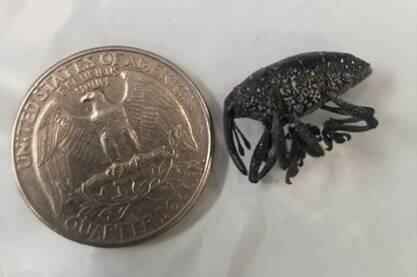
GULFPORT, MS – U.S. Customs and Border Protection (CBP) agriculture specialists working at the Port of Gulfport made two first-in-Mississippi pest discoveries in fruit shipments during the month of March.
The first discovery was identified as a Cholus sp (Curculionidae), a weevil species that prohibited in the United States because of the damage it can cause to forests and trees. The pest was discovered March 9 when a shipment of fresh pineapples was referred to agriculture for inspection. Upon inspection, CBP agriculture specialists discovered the pest and submitted it for identification to a U.S. Department of Agriculture entomologist, who confirmed it as Cholus sp (Curculionidae), commonly known as snout weevils. The family Curculionidae is a large family of about 3,000 species found in North America, including snout beetles and true weevils. Although the species vary in size and shape, they are characterized by distinctively long snouts with antennae rising from the middle of the snout. These plant feeders are in the subfamily Molytinae, of which most members are moderate in size and dark-colored.
The second pest was discovered March 30 in a shipment of fresh bananas, and was identified as a Scarabaeidae Beetle, or Stenocrates bicarinatus Robinson. There are more than 30,000 species of scarabs, often found in Costa Rica. They are stout-bodied beetles, many with bright metallic colors, measuring between 1.5 and 160 mm. Their larvae, called grubs, are C-shaped and are pale yellow or white. The grubs mostly live underground or under debris, so are not exposed to sunlight. Many scarabs are scavengers that recycle dung, carrion, or decaying plant material. Others, such as the Japanese beetle, are plant-eaters.

“To find an insect this small in such a large shipment not once, but twice, speaks to the dedication and professionalism of our agriculture specialists here in Gulfport,” said Gulfport Port Director Rodolfo Chacon. “I’m proud of the great work they do each day to protect the nation’s agriculture.”
The Cholus cp was first discovered in the United States in a shipment of corn that was seized by CBP agriculture specialists in Brownville, Texas. Since then, it has been intercepted at ports in Miami, Atlanta, and Los Angeles. The Scarabaeidae Beetle has previously been discovered in Philadelphia and Miami.

